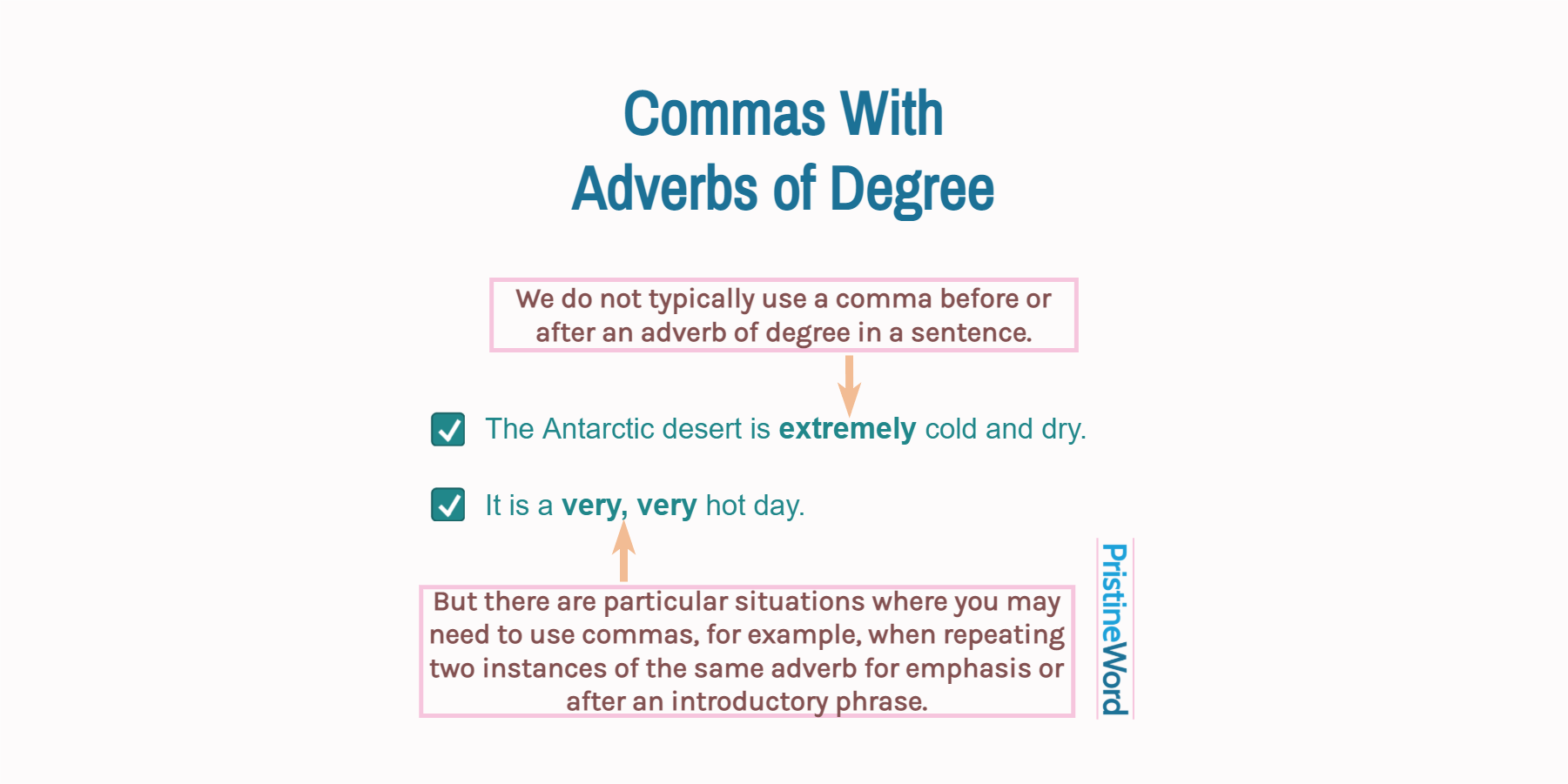We do not typically use a comma before or after an adverb of degree in a sentence. But there are particular situations where you may need to use commas.
We do not typically use a comma before or after an adverb of degree in a sentence.
The Antarctic desert is extremely cold and dry.
The box isn't big enough.
But there are particular situations where you may need to use commas, for example:
- when repeating two instances of the same adverb for emphasis (e.g., "It is a very, very hot day."),
- when adding nonessential information,
- when using sentence adverbs, or
- after an introductory phrase.
Contents
1. Quick Review of Adverbs of Degree
Adverbs of degree help us describe "how much" or "to what degree" we do something. They can also specify the degree to which an adjective or another adverb applies.
My brother is very tall.
Rebecca has almost finished.
1.1 Types of adverbs of degree
Some adverbs of degree can be used as amplifiers (e.g., extremely, absolutely, strongly, completely, heartily, very, really, totally, too, seriously, badly, greatly).
The soup is extremely hot.
That event entirely changed my life.
Other adverbs of degree are down-toners (e.g., mildly, sort of, kind of, fairly, almost, to some extent, rather, quite, nearly, enough).
The flavor is mildly sweet.
She is fairly quiet.
1.2 Location
Adverbs of degree are commonly placed before the verb, adjective, or adverb they describe.
She is really angry.
The book is quite interesting.
When using an auxiliary verb, the adverb of degree usually goes before the main verb.
He has almost finished.
But sometimes we change the position for emphasis.
I disagree completely with Emma Miller.
Your argument doesn't convince me totally.
The adverb "enough" always goes after the adjective or adverb it modifies.
Is the orange juice cold enough for you?
They are not old enough to get married.
By contrast, as a determiner, "enough" goes in front of the noun it determines.
Yes, that's enough coffee for you.
The adverbs "very" and "too" (when meaning "excessively") go before the adjective or adverb they describe.
It is a very tall mountain.
She is too young for me.
Similarly, the following adverbs are mostly used in front of the verb or the adjective: almost, really, quite, largely, and nearly.
She almost falls to the floor.
My boyfriend is really quiet.
2. When to Use Commas With Adverbs of Degree
2.1 Adverbs of degree in mid-sentence
When an adverb of degree is used in mid-sentence to modify a single word (verb, adjective, or adverb), we do not use a comma to separate the adverb from the word it modifies.
He is extremely arrogant.
He is extremely, arrogant.
But there is an exception to the practice of not placing a comma between an adverb and the word it describes. When repeating an adverb of degree for emphasis, we use a comma to separate both instances of the same adverb.
She is a very, very cute girl.
An adverb of degree may also be preceded or followed by a comma when adding a parenthetic expression or an interrupter of the sentence flow.
The girl, completely obvious to my presence, took her top off and danced on the sofa.
2.2 Introducing a sentence with an adverb of degree
At the start of a sentence, we do not generally need a comma after an adverb of degree, but you can use it to clarify, improve the sentence rhythm, or add emphasis.
Largely, the audience was composed of distinguished personalities and members of Congress.
Really, I didn't know that!
Place a comma after the adverb (or the adverb phrase) of degree if it reflects the writer's view or opinion rather than describe a single word. In such a situation, the comma signals that the adverb applies to the sentence as a whole.
Most importantly, he decided to accept the offer.
When the introductory adverbial phrase of degree does not express the writer's view or opinion, the comma is optional with short prepositional phrases (four words or fewer).
To a large extent these problems are man-made.
But use a comma if there is any chance of confusion.
To a lesser degree, they participate in the execution of projects under the supervision of a healthcare professional.

